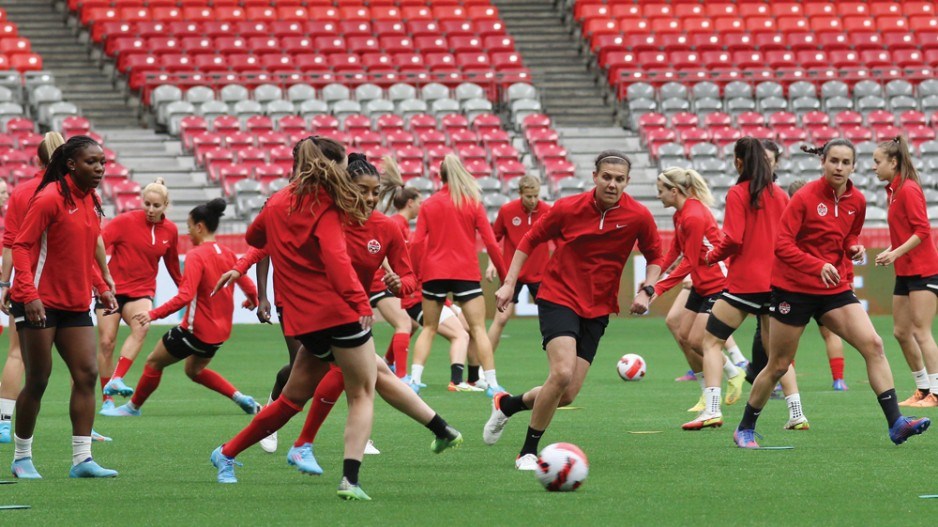Fans, players and front-office workers across the continent are hoping to finally welcome back public sports events unhampered by the COVID-19 pandemic.
Among the chief local venues, BC Place stadium is poised to have one of the busiest years in its history with more concerts and sporting events on the roster. In a possible sign of a return to normal, the stadium welcomed the Canadian women’s national soccer team in an April 8 exhibition game against Nigeria.
Major League Soccer (MLS), Major League Baseball and associated minor leagues will be the first North American sports organizations to enter their third season after the global shutdown. The pandemic hit their Canadian teams and fans especially hard. Soccer and baseball teams had to play their 2020 and 2021 seasons in the United States to avoid issues with players crossing the border. After missing two seasons of gate and concession sales, the organizations are eager to get fans in seats from both a team and business perspective. Smaller leagues, which are much more dependent on stadium revenue and game-day sponsorship partners than from TV contracts, are particularly relieved.
“On the sporting side we managed things well; we went to the playoffs for the first time in many years.” said Axel Schuster, CEO of Vancouver Whitecaps FC. “But for the business side, our numbers, our budget, it has been two disastrous years. Not only didn’t you have all your revenue, you also had more expenses.”
In 2021, the Whitecaps were relocated to just outside of Salt Lake City after spending the end of 2020 in Orlando. At the same time, the minor league Vancouver Canadians baseball team was sent just outside of Portland, Oregon, after the league cancelled the 2020 season.
“Two years ago, we didn’t actually know until it happened that we weren’t going to play, and it had really negative consequences financially,” said Canadians co-owner Jake Kerr, on Business in Vancouver’s BIV Today podcast. “Last year … we were redirected to play in Oregon, now you can imagine how interested the people in Portland are to watch the Vancouver Canadians. From the standpoint of the fans up here, it was a complete non-event and, financially, it was a beating.”
The team had to absorb the cost of rent while not playing in Vancouver.
However, BC Place was in a much different position. Without the stadium’s traditional mainstays providing regular gate and concession revenue, its management had to come up with creative ways to keep revenue coming through the door. It turned to new sources, including hosting film and television shoots and banquets, assistant general manager Jenna Visram said.
Visram said that while revenue took a hit, the biggest impact was on BC Place’s employee base. The last major event held at the stadium before the pandemic was the 2020 Rugby Sevens tournament. After being reduced to half-capacity crowds in 2021, the venue is ready to welcome back the tournament this weekend with all major countries competing and 100% crowd capacity – and no vaccination check.
Rugby, baseball and soccer are not the first sports teams to return to the city. Late last summer, the Canadian Football League’s BC Lions played its first game in over a year. A few months later, the Vancouver Canucks season got off to a rocky start as the last organization in the National Hockey League (NHL) to announce that its arena would be returning to full capacity. When the Omicron wave hit in the middle of the NHL season, Rogers Arena was reduced to half capacity for two months.
Aside from the uncertainty surrounding potential COVID restrictions that affected pre-season ticket sales, the recovery of Vancouver’s professional sports sector has been marred by overall economic conditions.
During tough economic times sponsorships and advertising budgets are often the first to be cut. Schuster said that these partnerships are key to the business.
“It’s about ramping up the business together with our partners. What is the next step we can take together, where we can also be the platform for them to present themselves [to Vancouver] again?”
While fans and dollars are starting to return, sports organizations still have a long road to travel to get to where they were in 2019. Schuster said that the soccer’s low profile among Canadian sports fans means that it will take time for the game to reintroduce itself to the city and for crowds to return to what they were pre-pandemic.
But there might be some good news for the sport.
Recent gold medal success for the Canadian women’s national soccer team at the Tokyo Olympics in 2021 and the World Cup qualification for the men’s team might be a golden opportunity for Canadian MLS teams.
The Whitecaps organization has made long-term investments in youth soccer programs across the country to help develop Canadian soccer talent to the point where it can compete on the international stage.
Canadian soccer fandom across the country is at an all-time high, and the MLS is on the cusp of new broadcast deals, with big expectations of profitability at a time when no MLS teams are operating in the black.
As fans begin to walk through the gates, revenue will return. Schuster said he thinks 2022 will be a transition year for the Whitecaps and that it will recoup what it lost during the pandemic. With advanced ticket sales looking promising, Kerr agreed that 2022 will be a rebuilding year for the Vancouver Canadians.
“There is great enthusiasm to get back to the Nat,” said Kerr.




